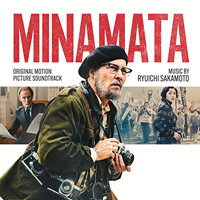- Composed by Ryuichi Sakamoto
Based on the ecological disaster in the Japanese town of Minamata, in which toxic chemicals being poured into local waterways from a factory over several decades led to huge numbers of local citizens suffering from mercury poisoning, Minamata stars Johnny Depp as photojournalist Eugene Smith and reportedly for that reason – given Depp’s own toxic status which developed through the “Amber Turd” revelations after the film had finished production – it remains largely unseen and the studio seems in no hurry to change that. Still, Ryuichi Sakamoto’s score has now been released – in his late 60s, the composer and musician is going through the most prolific period of his film composing career and nobody who has kept up with his work over the last few years will be particularly surprised at the dual tones of the score, in which he contrasts a heartbreaking central theme and stirring drama with some industrial electronica. What may be a surprise is that the balance is very much towards the former.
That central theme gets a brilliant airing in the opening “Minamata Piano Theme” – it’s got some depth to it, a kind of beauty that ebbs and flows through some sadness. Other melodic highlights include the melancholic “Boy and Camera” and a piece I find totally captivating, “Offer”, in which an eerie (synth?) wind sound has a really unusual feeling before more conventional string-led drama takes hold for a particularly intense second half. “Commitment” alternates the piano theme (including much warmer variants on it) with some delightful choppy string music, sounding like a “turning the tide”-type cue. “Rising” isn’t as warm but here Sakamoto takes that secondary element from the earlier piece and turns it into firmly-wrought if brief statement of grit and determination. “Mother and Child” brims with emotion – heartbreak and beauty. The score’s other side comes in cues like “Hidden Data” and “Chisso Gate” in which Sakamoto brings out his percussive synth style – it’s very deliberately and very appropriately pretty horrible to listen to. While this style does dominate the final third of the score, taken as a necessary contrast to the more accessible material in order to tell the complete story through music it would seem to be missing the point somewhat to try to present an argument that the album could have been better-served without it, but I do think there’s a case that sequencing the tracks differently could have led to a slightly more compelling piece of musical drama when divorced from the film. “Coda” actually moves quite brilliantly between the two styles – it’s the album’s standout track, featuring a great wordless female vocal alongside the synths and strings; and then there’s another great piece after it, “Icon”, a gentle piano solo version of the theme for Depp’s character. There is some beautiful music here, including a couple of stunning and very moving tracks – you have to take the rough with the smooth to an extent, but there’s certainly enough to make it worth checking out.
Rating: ***
facebook.com/moviewave | twitter.com/MovieWaveDotNet | amazon.com












It‘s quiet in here! Why not leave a response?